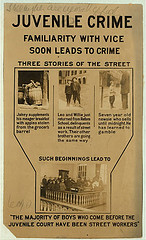Expunging Juvenile Records: Delinquent vs. Criminal Proceedings
People often engage in conduct early on in life which they live to regret in their adult years.
 While most situations of this conduct doesn’t involve the justice system there are situations where a young person’s actions involve the courts. While these illegal actions committed by juveniles are crimes, Pennsylvania doesn’t classify juvenile proceedings as criminal under the Juvenile Act. See 42 Pa.C.S.A. §6354(a). Technically, juveniles aren’t charged with crimes but rather charged with committing “delinquent acts”. Further, juveniles don’t have trials but “adjudicatory hearings.”
While most situations of this conduct doesn’t involve the justice system there are situations where a young person’s actions involve the courts. While these illegal actions committed by juveniles are crimes, Pennsylvania doesn’t classify juvenile proceedings as criminal under the Juvenile Act. See 42 Pa.C.S.A. §6354(a). Technically, juveniles aren’t charged with crimes but rather charged with committing “delinquent acts”. Further, juveniles don’t have trials but “adjudicatory hearings.”
If at the end of a hearing the charges are “substantiated” the juvenile is not convicted but “adjudicated delinquent.” Unlike adult criminal proceedings the purpose of juvenile proceedings and the juvenile act is to allow for treatment, reformation and rehabilitation and not to punish. The laws pertaining to juveniles therefore are remedial in nature and not considered part of the penal code. It is for these reasons that courts evaluate the expungement of a juvenile’s record much different than the expungement of an adult’s record.
Pennsylvania defines an expungement as the removal of information so that there is no trace or indication that such information existed. Adults and juveniles are entitled to expungements in Pennsylvania provided that they meet certain criteria. In both situations, the Commonwealth may object to the expungement and the burden is on the prosecution to demonstrate a reason why the record should not be expunged. For adult proceedings, court’s evaluate a person’s expungement petition based on the “Wexler factors.” I have previously written on adult expungement proceedings and encourage you to read that article. The “Wexler factors” however, don’t apply to juvenile proceedings because they aren’t criminal. See In the Interest of A.B., 987 A2d769(2009).
In Pennsylvania, a juvenile is entitled to an expungement as a matter of law if he/she meets one of the following criteria:
- The complaint filed against the juvenile is not substantiated and, as a result, is dismissed by the court;
- Six months after the juvenile is discharged from supervision under a consent decree and there is no other pending matter against the juvenile;
- Five years after the juvenile is discharged from commitment, placement, probation, or any other court imposed condition and the person (maybe still a juvenile or now an adult) hasn’t been convicted of anything else and there are no pending charges against the person; or
- The person is 18 years of age or older, the Commonwealth consents to the expungement, and the court approves this agreement. See 18 Pa.C.S.A. §9123(a).
It’s important to understand that even if the prosecution and the person seeking the expungement (the petitioner) agree to the expungement the court must evaluate whether it should be granted based on the person’s conduct following the juvenile adjudication. The court will evaluate the expungement petition based on the type of offense, the individual’s age, employment history, criminal activity, and any drug or alcohol related problems. Further, the court will also look at the adverse consequences that the individual may suffer if the record isn’t expunged and if retaining the record would protect the general public. See In the Interest of Jacobs, 344 Pa.Super.613 (1984). While juveniles are entitled to expungement there are certain offenses within the Juvenile Act which fall outside this general rule. The court in these situations will evaluate the expungement petition using the adult factors in Wexler.
An expungement can dramatically change a person’s professional opportunities. You should never assume that you aren’t eligible for an expungement and you should always speak to a qualified attorney to understand your options.
